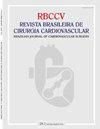巴西葡萄牙语跨文化翻译及口腔抗凝知识工具(AKT-Br)的验证
IF 1.2
4区 医学
Q4 CARDIAC & CARDIOVASCULAR SYSTEMS
Revista Brasileira De Cirurgia Cardiovascular
Pub Date : 2022-05-23
DOI:10.21470/1678-9741-2020-0731
引用次数: 0
摘要
口服抗凝剂是治疗多种类型凝血障碍的首选药物。华法林在巴西人群中被广泛使用,可能是因为它比其他口服抗凝剂成本更低。然而,如果使用不当,它有很高的风险产生严重的不良反应。抗凝知识工具(AKT)可以评估患者对其口服抗凝治疗的知识,并可以帮助卫生专业人员识别有依从性困难的患者。本研究旨在将AKT翻译、文化适应和验证为巴西葡萄牙语。方法采用标准的正反向程序将AKT转化为巴西葡萄牙语(AKT- br)后,将该仪器的一个版本应用于三组(患者、药剂师和一般人群)。使用内部一致性测量和重测来测试AKT-Br的可靠性。用对比组的数据证实了仪器的有效性。所有统计分析均使用RStudio进行。结果药师、患者和一般人群的AKT-Br评分中位数分别为29.0分、17.0分和7.5分(最高35分)。仪器内部一致性中等,重测信度令人满意。组效度的方差分析显示总分与被评估组之间存在显著关系。结论ATK-Br是评估口服抗凝药物知识的可靠、有效的工具。AKT-Br可以在临床实践中作为辅助工具,通过个性化教育干预来改善患者护理。本文章由计算机程序翻译,如有差异,请以英文原文为准。
Cross-Cultural Translation into Brazilian Portuguese and Validation of the Oral Anticoagulation Knowledge Tool (AKT-Br)
Introduction Oral anticoagulants are the treatment of choice for diverse types of coagulation disorders. Warfarin is widely used by the Brazilian population, possibly due to its lower cost than other oral anticoagulants. However, it has a high risk of serious adverse effects if used incorrectly. The Anticoagulation Knowledge Tool (AKT) can assess a patient’s knowledge about her/his oral anticoagulant therapy and can assist health professionals in identifying patients with difficulties in adherence. This study aimed to translate, culturally adapt, and validate the AKT into Brazilian Portuguese. Methods After a standard forward-backward procedure to translate the AKT into Brazilian Portuguese (AKT-Br), a version of the instrument was applied in three groups (patients, pharmacists, and the general population). The reliability of the AKT-Br was tested using an internal consistency measure and test-retest. The validity of the instrument was confirmed with data from the contrasted groups. All statistical analyses were performed with RStudio. Results The median scores obtained with the AKT-Br were 29.0, 17.0, and 7.5 for pharmacists, patients, and the general population, respectively (maximum score of 35 points). There was moderate internal consistency for the instrument and test-retest reliability was satisfactory. Analysis of variance for validity of the groups revealed a significant relationship between the total score and the evaluated groups. Conclusion The ATK-Br is a reliable and valid tool to assess knowledge about oral anticoagulants. AKT-Br can be used in clinical practice as an auxiliary tool to improve patient care through personalised educational interventions.
求助全文
通过发布文献求助,成功后即可免费获取论文全文。
去求助
来源期刊

Revista Brasileira De Cirurgia Cardiovascular
CARDIAC & CARDIOVASCULAR SYSTEMS-SURGERY
CiteScore
2.10
自引率
0.00%
发文量
176
审稿时长
20 weeks
期刊介绍:
Brazilian Journal of Cardiovascular Surgery (BJCVS) is the official journal of the Brazilian Society of Cardiovascular Surgery (SBCCV). BJCVS is a bimonthly, peer-reviewed scientific journal, with regular circulation since 1986.
BJCVS aims to record the scientific and innovation production in cardiovascular surgery and promote study, improvement and professional updating in the specialty. It has significant impact on cardiovascular surgery practice and related areas.
 求助内容:
求助内容: 应助结果提醒方式:
应助结果提醒方式:


